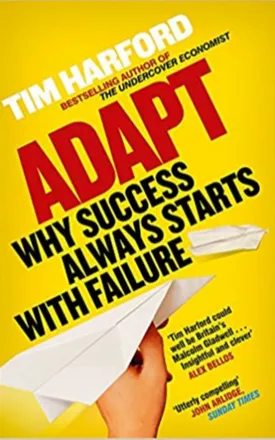Adapt: Why Success Always Starts with Failure by Tim Harford
When it comes to succeeding in anything, the only certain thing is failure. This is particularly true in the worlds of business and entrepreneurship. But in his book Adapt: Why Success Always Starts with Failure, Tim Harford explains why our society tends to view failure in such a negative light and how failure can actually be a positive force in achieving success.
Harford presents a compelling argument that our modern societies have become obsessed with the idea of success and often overlook the benefits of failure. He explains that the human brain is inherently risk averse, preferring to take the path of least resistance by repeating familiar activities. This tendency leads us to become stuck in a comfort zone, where the fear of failure keeps us from striving for excellence or attempting to make improvements. But Harford argues that the fear of failure need not be a barrier to progress; rather, it can actually be productive if we learn to embrace it.
At the heart of Harford's argument is the concept of “adaptation.” He explains that in order for us to make progress, we need to be able to distinguish between what succeeds and what fails. By taking the lessons we learn from our failures, we can adapt and improve. Harford explains that this is the key to unlocking our creative potential. Instead of cowering in fear and shying away from change, we should view failure as an opportunity to learn and become better.
Harford also points out that failure breeds resilience. We must learn to move beyond the initial setback and find the strength to continue forward. This is one of the biggest challenges in life, because failure is often a setback that causes us to reframe our view of the world. But Harford argues that if we learn to adapt and view failure as an opportunity rather than an obstacle, we can learn to be more resilient in the face of failure and eventually progress toward our ultimate goal.
One of the main takeaways from Harford's book is that success is never linear; it is a cyclical process. Harford explains that as we attempt to improve and strive for change, we will inevitably experience failures along the way. But having the capacity to learn from each of these failures is what makes adaptation possible and ultimately helps us reach our ultimate goal.
In sum, Tim Hartford’s Adapt: Why Success Always Starts with Failure provides a powerful argument for embracing failure and using it as a learning opportunity. Instead of letting it paralyze us, Harford advocates that we use failure as a stepping stone to success. By adopting a mindset of learning and resilience, we can use failure as a tool to shape our actions and make improvements. Ultimately, it’s the combination of failure and adaptation that drives progress and leads to success.

